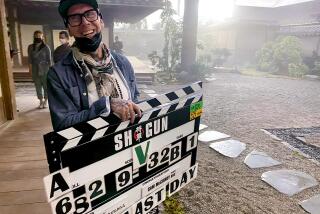A grotesque yet riveting mission
- Share via
The opening scene of “Gozu” makes clear that it’s not going to be anything like a traditional Japanese gangster picture, but then its maker, Takashi Miike, is arguably the most darkly audacious filmmaker in contemporary Japanese cinema -- and that includes even Takeshi Kitano. While drawn repeatedly to the yakuza genre, Miike is at heart a satirist with an infinite variety of shock tactics as his disposal.
Take that first scene. An aging yakuza boss (Renji Ishibashi) has called a meeting of his men in a restaurant. Through a window, Ozaki (Sho Aikawa), one of the boss’ lieutenants, spots a woman on the sidewalk carrying a Chihuahua and stopping to chat with a friend. Succumbing to paranoia, Ozaki declares that the tiny animal is a yakuza attack dog and reacts in what is a signature Miike shock moment, setting the plot in motion. In no time the boss creates a pretext for Ozaki’s young driver, Minami (Hideki Sone), to take him to Nagoya for a discreet termination.
A game but nervous novice, Minami fumbles the assignment and plunges into a comically surreal adventure that becomes a wildly Freudian allegory that intertwines sex, fear and the conflicting feelings parental figures elicit. The film unfolds as if it were a dream in which taboo subconscious urges surface symbolically as in a Dali painting, yet everything takes place in everyday settings.
In essence, “Gozu,” which is the name of a demon with a cow’s head attached to a human body, is composed of Minami’s encounters with a series of weird individuals who repress few of their kinkier urges. Key are Nose (Shohei Hino), a kindly homeless man with a skin condition, giving him the appearance of a derelict Harlequin, and a demented elderly brother (Harumi Sone, father of Hideki), who helps his sister (Keiko Tomita) run a small, deceptively inviting inn where Minami finds accommodations.
Although human behavior throughout the film is breathtakingly, even confoundingly weird, it remains recognizable, which was not the case in Miike’s notorious “Audition,” which contains some of the most horrific images ever concocted by a serious filmmaker. Miike is sometimes ill-served by his scripts, but here screenwriter Sakichi Sato never flags, coming up with one gloriously grotesque incident after another. As a comedy, “Gozu” could scarcely be darker, yet it ends on a surprisingly light note.
Daring as “Gozu” is in all that it depicts and suggests, it’s actually riskier for its measured, shaggy-dog-story pace; clearly, Miike intends to wring out every ounce of the alternately compelling and repelling effect he has on the viewer. At 125 minutes, “Gozu” is arguably too long for its own good, yet only rarely does Miike allow the focus to waver. It helps greatly that Miike is a bold visual stylist with a strong sense of composition. Miike inspires his actors to depict actions with a complete naturalness that surely no other director has ever asked them to attempt -- and it’s a pretty safe bet that they’ll never, ever be asked to repeat them. Never.
*
‘Gozu’
MPAA rating: Unrated
Times guidelines: Strong, kinky sexuality and language, some nudity and a depiction of extreme violence directed toward an animal
Hideki Sone...Minami
Sho Aikawa...Ozaki
Kimika Yoshino...Yakuza girlfriend
Shohei Hino...Nose
Keiko Tomita...Innkeeper
Harumi Sone...Innkeeper’s brother
A Pathfinder Pictures/Klockworx release. Director Takashi Miike. Producers Misako Saka, Shigeji Maeda, Tatsuya Mukai, Tsuneo Seto and Harumi Sone. Screenplay by Sakichi Sato. Cinematographer Kaz Tanaka. Editor Yasushi Shimamura. Music Koji Endo. Production designer Akira Ishige. Set decorator Akira Sakamoto. In Japanese with English subtitles. Running time: 2 hours, 5 minutes.
Exclusively at the Nuart, 11272 Santa Monica Blvd., West Los Angeles, (310) 281-6223.
More to Read
Only good movies
Get the Indie Focus newsletter, Mark Olsen's weekly guide to the world of cinema.
You may occasionally receive promotional content from the Los Angeles Times.










